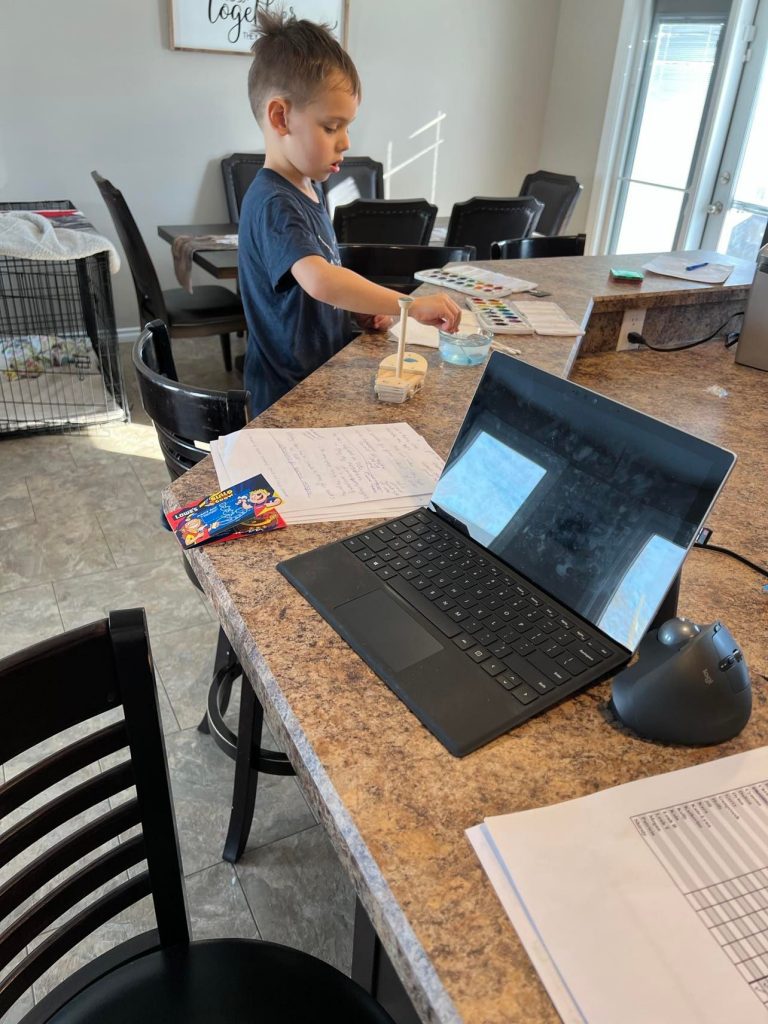
Balance, Balance, Balance. Everything should be balanced.
We know that life is not always perfectly balanced but we sure do feel it when we put to much emphasis on one area of our lives and not enough on others. Therefore we have to regroup and adjust. In a time where technology can consume so much of our lives I find it increasingly difficult to find a balance in raising children in a tech filled world. Technology gives us this amazing ability to just shut off the outside world but in doing so what are we giving up? Are we letting our children become unbalanced? Take a moment to think about the time they spend with technology. Does it consume most of their day when they are at home with you? What does their outside time look like? Imaginative or interactive play? How about hands on, messy art projects? Reading time or being read too? Exploration time? We all know how important these areas are in children’s development so my question still begs to be asked, is there a balance? Or are we leaning far to one side and forgetting the importance of the rest. I admit that I fail at times, we become unbalanced, or some days are more towards one side then the other and I see the emotional and behavioral change it causes in my children and myself. In a life that is so busy at times I forget to slow down and balance our lives out.

Here lies my worry for the future of education; will there be a balance?
In the article Future Work Skills 2020 the drivers for change two of the topics caught my attention. The first topic that I saw was the rise of smart machines and systems. Questions that came to the forefront was how much are we willing to give up of our own abilities and capabilities to be co dependent or solely reliant on technology? What does this mean for entry level jobs? Will there be less jobs available overall? Will unemployment continue to rise? We already see the effects of this when we head to Walmart, Superstore, Safeway, Shoppers Drug Mart, with self checkouts. These are jobs that are lost because we as humans can not be inconvenienced with having to wait to purchase our items. Do I appreciate self checkout? Yes. Could I do without them? Yes. I have made observations and a local grocery store who have self checkouts will allow lines to get so long and only have 2 cashier checkouts open. They do not open more cashier lines because they don’t have the people to man them as a result of the convenience of the self checkouts. Job loss due to technology. My last thought that I had with this drive for change was that of laziness. Is allowing for smart machines and systems to do things for us creating a new kind of lazy?
The second driving for change topic that sparked a fire was creating value in social technologies. In creating this value, is there going to be something also created for managing and holding people accountable for things put on social technologies? I am not talking about complete deformation of someone’s character but also the little things, the passive aggressive comments, the things that happen to everyday people that can cause damage. What will the safety and responsibility look like for the victims and perpetrators? We give our students daily reminders of being kind, fixing their mistakes, making things right, but who is going to monitor and how is it going to be monitored?
The article then discussed 10 skills for the future and I honed in on two of them. The first being social intelligence, “Our emotionality and social IQ developed over millennia of living
in groups will continue be one of the vital assets that give human workers a comparative advantage over machines” but how is this going to happen? Kids are losing the ability to have social and emotional connections with people, they are losing the ability to see how their words and actions immediately affect a person because they cannot see the physical discomfort of another person through social medias.
The other skills for the future that caught my attention was the new media literacy. I am left wondering about when will students be taught and become fluent in media literacy, at what grade do we begin? What do we begin with? I believe there may need to be curriculum changes, significant training of teachers & support staff new and old and a whole crap ton of support. Although from reading other classmates blogs, there might have been someone who is looking into this as their major project.

“9 Things That Will Shape The Future Of Education” and TEDED articles are the terrifying part for me
A rush of anxiety is what I felt when reading this. I hated it, I hated teaching virtually. I just see students working at their own pace (ha for those who actually could and do not need CONSTANT motivation), it is self guided which almost feels like university classes I have taken in the past. How do children manage this? How do parents manage this? Has the logistics of this been thought through? If so I am really interested to hear it; although I fear that I may leave education if this becomes the norm. I thrive on teaching face to face, my personality likes us to all be together going through a journey and experiencing the ups and downs as a whole, as a family, growing and learning together. The idea of not having a physical space for school my mind cannot understand. We saw what happened when students couldn’t make social connections and their ability to interact became strained, problem solving conflict issues was difficult. If students are struggling mentally we will miss all the physical signs, we won’t “know” our students in the same way we do now. What about children who have special needs and need a inclusion model to learn? I see so many issues, of course I can see some positive but the issues out weigh the positive, it has too. Maybe these changes will occur in the higher levels and not at the elementary level? I don’t know the answers but this makes me sad.
I go back to my question from the very beginning, will there be a balance?

Christine, your thoughts, your questions made me think a lot. These are the questions that I believe every parent and educator has in their mind but many are unanswered. Finding a balance is too difficult. Yes, technology and being media literate make our life much easier and fast. However, it also creates too many complexities. But let’s hope future education helps in more personal social interaction.
You raise many valid concerns in a thoughtful and considerate way. Despite my appreciation of technology, I 100% agree that there needs to be a balance. We still need many opportunities for hands-on active play/movement/social learning. I can feel your frustration and hope that you stay in education. In all ways, we need diverse voices to provide balance when schools & school boards decide how to best approach digital integration.
Although most of our first tastes of online learning happened in quite a stressful environment that wasn’t balanced in pretty much any way you looked at it, I am hopeful to think that virtual learning could be a good thing for many out there. However, like open space learning, virtual learning isn’t for everyone, and I think that it is epescially difficult for children that don’t have the experience, matruity and dedication to be successful (quite yet). I too think that there were a lot of frustrating experiences with the virtual learning thus far, and making those connections was definitely a lot harder. But I also saw some beautiful things of kiddos finding their voices, and feeling more confident. A lot of students that were overshadowed in the classroom finally had some light. All in all, when incorporating technology in face-to-face learning, we need to use it to enhance learning instead of just using tech to use tech. Great post! You raised so many great points.
Christine, I echo so much of what you’ve said! As an early years teacher, I am definitely hesitant to engage my students in screen time and don’t allow them to use the iPads in my classroom for their leisure (actually, right now, I don’t let them use them at all). I don’t feel that screens and devices (or learning 100% online) can act as a replacement for face-to-face social interactions, but perhaps as more of a supplement. Like you, I question the practicality of the Ted-Ed article that claims we will move to online learning. That is not the direction I see education headed in, either. I do see it having a balance, where tech is used as a supplementary tool to learning rather than the be all, end all answer to everything.
Christine, your article made me reflect on the things or practices that are being done around us on an everyday basis. In this busy lifestyle, we are unable to notice the small changes that have occurred due to advancements. I appreciate the use of technology but I agree with the fact that balance plays a vital role in our lives. Maintaining a balance is complex still I believe digital literacy will gradually take us to the road of maintaining balance as well.
Appreciating the contemplative exploration of the future of education, the article adeptly navigates the complexities of maintaining balance amidst technological advancements. It underscores the necessity of integrating innovation while preserving fundamental educational values. When considering MBA and B.Tech colleges in Greater Noida, it emphasizes the importance of adapting educational practices to meet evolving needs without compromising on foundational principles.
Christine, your thoughts on finding balance in a tech-filled world are so important! It’s easy to get caught up, but we need to make time for other crucial aspects of life. Are we giving our children the well-rounded experiences they need? Let’s not forget the importance of imaginative play, hands-on projects, and reading time. Your concerns about the future of education are valid – will there be a balance in the ever-changing landscape? Let’s keep exploring these questions together!
Very helpful article!
Thought-provoking and insightful article on the future of education! Your concerns about balancing technology and personal connection are crucial and resonate deeply. Thanks for sharing!
The blog post concludes by expressing the author’s anxieties regarding the future of education and the need for a balanced approach.
Every parent should accept your information such a research study deeply current education system thank you
Thanks for sharing this insightful article on the future of education! The reflection on the potential anxieties and the need for a balanced approach is very valuable.
A4S is the “best” coaching in Greater Noida because it is subjective and depends on individual student needs. Here are some factors that contribute to the A4S HUB Classes’ reputation in Greater Noida. A4S provides coaching for various exams, including IIT-JEE, NEET, NDA, and CUET, catering to diverse student aspirations(https://a4shub.com/).
This blog post raises important questions about balance in the future of education. It’s crucial to consider how we can harness innovation while ensuring equitable and holistic learning experiences for all students.
strv is provide communication class combo and a elite course with successfull alumini
This post raises a crucial question about balance as we navigate the future of education. The potential for both exciting advancements and unsettling disruptions certainly warrants careful consideration.